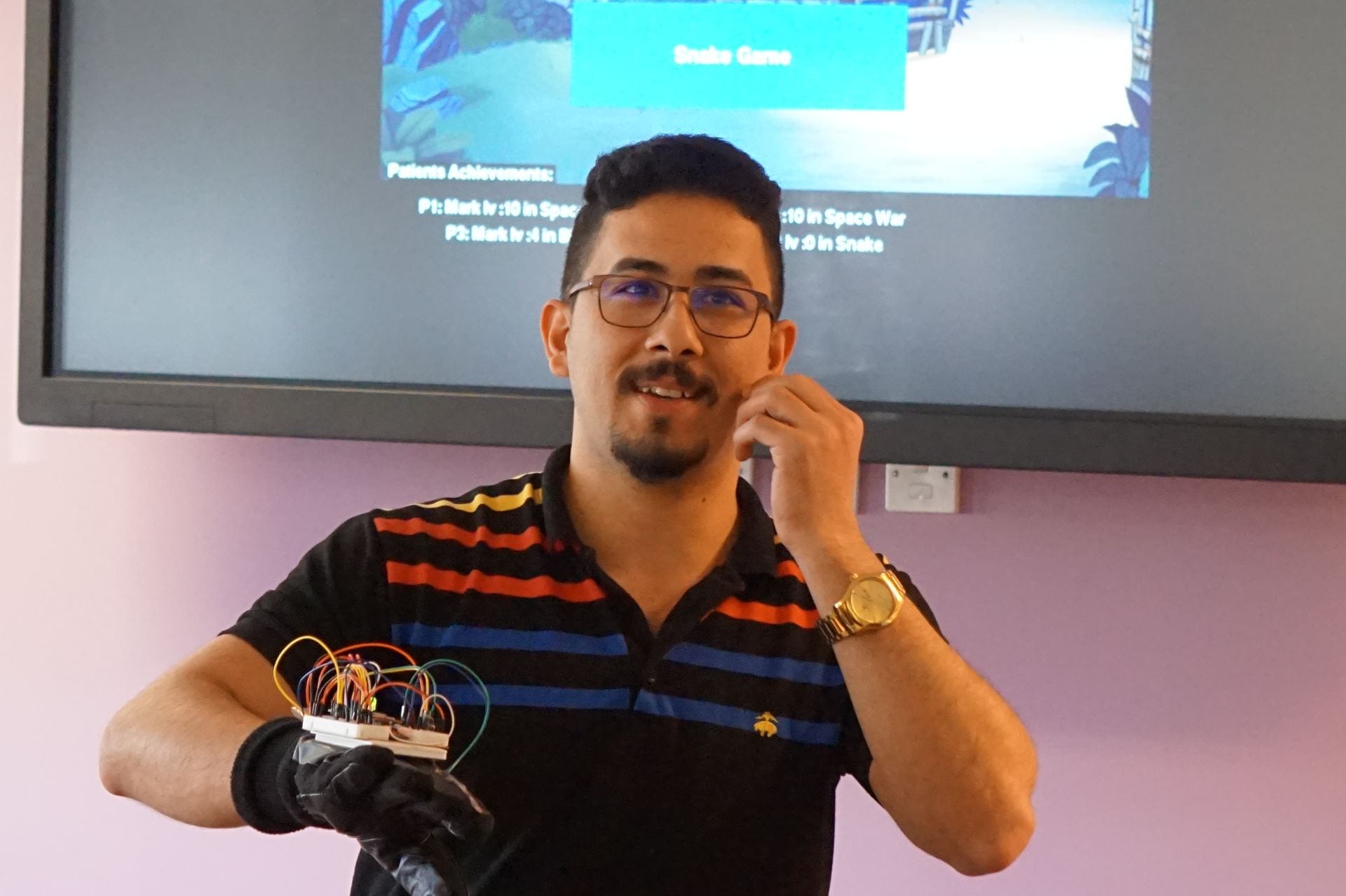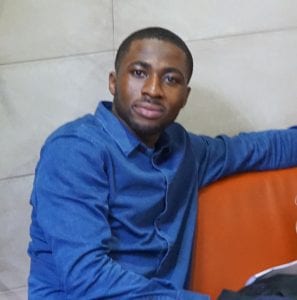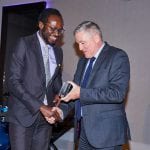A Study of Recent Counter-Measure Techniques to Resolve Cache Security Vulnerabilities
A Study of Cache Management Mechanisms for Real-Time Embedded Systems: Murtada
Arduino WiFi Robot Car Assembly
Liliana Presents on ILP
Paper: Liliana Margarita Espinosa Jimenez and Michael Opoku Agyeman. 2018. A Study of Techniques to Increase Instruction Level Parallelisms. In Proceedings of the 2nd International Symposium on Computer Science and Intelligent Control (ISCSIC ’18). ACM, New York, NY, USA, Article 41, 5 pages. DOI: https://doi.org/10.1145/3284557.3284562
Noor Presents on Reconfigurable Accelerators for Cloud Computing
Paper: Noor Mohammedali and Michael Opoku Agyeman. 2018. A Study of Reconfigurable Accelerators for Cloud Computing. In Proceedings of the 2nd International Symposium on Computer Science and Intelligent Control (ISCSIC ’18). ACM, New York, NY, USA, Article 17, 5 pages. DOI: https://doi.org/10.1145/3284557.3284563
Mr. Julius Azasoo: PhD Researcher
Achievements
- Second place Winner of the International Cortext Lab Challenge,IRACON Training School, France Grant, 2018
- IRACON Training School, Ireland Grant 2018
- IRACON Training School, France Grant 2018
- EMDOC Logo Competition Winner 2017
- Organising Member and Section Chair of the Graduate School PGR and ECR Conference 2017
- Beneficiary of Santander Mobility Fund 2017
Publications.
- PAR Reduction in Generation Constrained Power System Through Microload Management (Under review 2018)
- AZASOO, J.Q., Kuada, E., Boateng, K.O. and Agyeman, M.O., 2017, June. An algorithm for micro-load shedding in generation constrained electricity distribution network. In PowerAfrica, 2017 IEEE PES (pp. 396-401). IEEE.
- Tweneboah-Koduah, S., Tsetse, A.K., AZASOO, J.Q. and Endicott-Popovsky, B., 2018. Evaluation of Cybersecurity Threats on Smart Metering System. In Information Technology-New Generations (pp. 199-207). Springer, Cham.
- Azasoo, Julius Quarshie, and Kwame Osei Boateng. “Optimizing the effects of load-shedding through micro-load management in generation constrained power system.” In Computer and Communications (ICCC), 2016 2nd IEEE International Conference on, pp. 2938-2943. IEEE, 2016.
- Owusu-Ansah, S., Azasoo, J.Q. and Adu, I.N., 2016. Understanding the effects of techno-stress on the performance of banking staff. International Journal of Business Continuity and Risk Management, 6(3), pp.222-237.
-
Engmann, F., Abdulai, J.D. and Azasoo, J.Q., 2016, July. Enhancing the Reliability of WSN Through Wireless Energy Transfer. In International Conference on Computational Science and Its Applications (pp. 610-618). Springer, Cham.
-
Azasoo, J.Q. and Boateng, K.O., 2015, June. A Retrofit Design Science Methodology for Smart Metering Design in Developing Countries. In Computational Science and Its Applications (ICCSA), 2015 15th International Conference on (pp. 1-7). IEEE.
- Engmann, F., Abdulai, J.D. and Azasoo, J.Q., 2015, June. Improving on the reliability of wireless sensor networks. In Computational Science and Its Applications (ICCSA), 2015 15th International Conference on (pp. 87-91). IEEE.
Curriculum Development/Text Books
- Azasoo, J., 2018. Multimedia Tools and Applications. Link: http://oer.avu.org/handle/123456789/687
- Azasoo, J., 2018. Web Technologies and Internet Programming. Link: http://oer.avu.org/handle/123456789/686
Mr Emmanuel Ofori-Attah: PhD Researcher
Emmanuel Ofori-Attah is a Graduate Teaching Assistant (GTA) at the Department of Computing and Immersive Technologies at the University of Northampton. He received his BEng (Hons) Degree in Computer Systems Engineering at the University of Northampton in 2016 and was offered a scholarship as a GTA and a funded PhD. As of 2017, Emmanuel is currently doing his PhD on Low Power Embedded Systems.
Publications and Presentations:
- Ofori-Attah, E., Opoku Agyeman, M. and Turner, S. J.(2018) A survey of application mapping techniques for many-core designs. Invited Presentation presented to: University of Northampton Research Conference 2018, University of Northampton, 20-21 June 2018.
- Ofori-Attah, E., Wang, X. and Opoku Agyeman, M. (2018) A survey of low power design techniques for last level caches. Lecture Notes in Computer Science. 10824, pp. 217-228. 0302-9743.
- Ofori-Attah, E. and Opoku Agyeman, M. (2018) A survey of low power design techniques for last level caches.Poster presented to: 14th International Symposium on Applied Reconfigurable Computing (ARC 2018), Santorini, Greece, 02-04 May 2018.
- Ofori-Attah, E. and Opoku Agyeman, M. (2018) A survey of power-aware Network-on-Chip design techniques.The Thirteenth International Multi-Conference on Computing in Global Information Technology. 2308-4529.
- Ofori-Attah, E., Opoku Agyeman, M. and Turner, S. J.(2018) Low power design for many core systems.Invited Presentation presented to: 3MT: Three-Minute Thesis Competition, Northampton, 21 June 2018.
- Ofori-Attah, E., Wang, X. and Opoku Agyeman, M. (2018) A survey of system level power management schemes in the dark-silicon era for many-core architectures. EAI Endorsed Transactions on Industrial Networks and Intelligent Systems. 5(15) 2410-0218.
- Ofori-Attah, E., Bhebhe, W. and Opoku Agyeman, M.(2017) Architectural techniques for improving the power consumption of NoC-based CMPs: a case study of cache and network layer. Journal of Low Power Electronics and Applications. 7(2) 2079-9268. 2016
- Ofori-Attah, E. and Opoku Agyeman, M. (2016) A survey of low power NoC design techniques. In: International Conference on High-Performance Embedded Architectures and Compilers (HiPEAC). Sweden: ACM.
- Ofori-Attah, E. and Opoku Agyeman, M. (2016) A survey of low power techniques for efficient Network-on-Chip design. In: 23rd IEEE Symposium on High Performance Computer Architecture (HPCA). USA: IEEE.
- Ofori-Attah, E. and Opoku Agyeman, M. (2016) A survey of recent contributions of high performance NoC architectures. In: IEEE Technically Sponsored Computing Conference 2017. London: IEEE.
Michael wins the UoN’s International Changemaker of the Year award.
CIDI’s Smart and Connected Systems (SCS) research theme leader Dr Michael Opoku Agyeman wins the International Changemaker of the year award.
The award was in recognition of the significant impact made towards alleviating the social issues in developing countries through the SmartWorld project http://www.computing.northampton.ac.uk/~michael/SmartWorld/index.html.
Michael is the founder of the SmartWorld initiative, an international collaborative project that uses technology, particularly Internet-of-Things (IoT), to provide solutions to the potential crisis in developing countries.
Through the SmartWorld initiative, Michael has put new technology methods in place to produce a real-world practical solution to these issues in the form of projects, dissertations and research. In addition, the project has attracted externally funded international students to the University of Northampton. Michael continues to inspire students with his ambitious tenacity that highlights the multidisciplinary benefits of using computing to improve health and well-being on a global scale.
Mr. Ahmed Janabi: PhD Researcher
Mr Ahmed Janabi. PhD Student in Wireless Network-on-Chip
Experience
- The Head of IT Unit Al-Mustaqbal University College Hilla, Babylon, Iraq November-2017 – September-2018
- Teaching Assistant Al-Mustaqbal University College Hilla, Babylon, Iraq October-2017 – September-2018
- PHP Developer
- Al – Kafil Institute for Information Technology
- Karbala, Iraq January-2018 – July-2018
- Teaching Assistant University of Babylon Hilla, Babylon, Iraq February-2018 – June-2018
- Teaching Assistant University of Babylon
Hilla, Babylon, Iraq September-2017 – February-2018 - Teaching Assistant University of Babylon
Hilla, Babylon, Iraq September-2017 – February-2018
Education
- BEng in Computer Network Engineering. University Drive, Northampton NN1 5PH, UK 2017
- BSc, University of Babylon Hilla, Babylon, Iraq 2014
- IELTS Course, Central Bedfordshire College Kingsway, Dunstable LU5 4HG, UK 2015
Skills
Programming Languages: PHP, Java-Script, HTML, CSS, ActionScript 3, jQuery, VB6, VB.net Networks (CISCO training), C# and C++., Applications: Eclipse, Notepad++, Microsoft Word, Excel, and PowerPoint, Adobe Flash Player, MatLab, Xcode, BlueJ, CAD, Android Studio and several others… Operating Systems: Windows Xp, 7, 8, 10, Macintosh OSX, Android, CentOS.
Languages
- Arabic English
- Advanced Advanced
Projects
- 2011-2014: Developed many VB projects in my high school/university carrier including the traffic light application, Accountant app, poker game, Clock Program and Other simpler projects include Rock Paper Scissors and calculator app.
- 2016: Developed a fully functional blackjack game using Shell Script language.
- 2016-2017: I developing an Internet of Things (IoT) Smart Home System project using Raspberry PI 3, Relay Shield, Android Studio, and a couple of sensors to make a web server-driven project, controlled by an Android application to control lights, TVs, Air-conditioners, ..Etc.
- 2017: I developing an Internet of Things (IoT) Smart City System project using Raspberry PI 3, Relay Shield, PHP, MySQL, GPS Device, and a couple of sensors to make a web server-driven project, when happening a traffic accident, the system will send a notice to the nearest police station and hospital and this notice contains the vehicle information and the location of the accident, by using Web application and Android application ..Etc.
- 2017: I developing an Internet of Things (IoT) Tracking the Elderly people project using android watch, Android Studio, PHP, MySQL, GPS Device, and a couple of sensors to make a web server-driven project, when the person wear the watch in his left hand and this watch will send the patient information to the monitor website and his android mobile application, this information including patients heartbeat, send a notification to the monitor if the patients heart stop, patients body temperature, the number of steps that patient walked today, the current location of the patient, the number of times that patient use the toilets. ..Etc.
Certificates & Courses
- 2014: Shield of Scientific Excellence from the University of Babylon.
2016: 1st place in the (UoN) Internet Of Things “Entrepreneurship in Technology” Event.
2016: MTA Networking Fundamentals Certification.
2017: Shield of Scientific Excellence from the Iraqi Cultural Attaché in London.
2017: Medal of Scientific Excellence from the Minister of Higher Education and Scientific Research of Iraq. 2017: 2nd place in the (UoN) Internet Of Things “Entrepreneurship in Technology” Event.
2018: A certificate of thanks and appreciation from the Dean of Al-Mustaqbal University College.
2018: Certificate of the best assistant teacher from the Dean of IT College/University of Northampton. 2018: Certificate of participation in the workshop QS for the University Ranking.
Dr. Michael Opoku Agyeman: Research Leader
Dr. Michael Opoku Agyeman is a Charted Engineer (CEng) of the IET and a Fellow of Higher Education Academy (UK) who is a Senior Lecturer and the Programme Leader of BEng, HND, MEng Computer Systems Engineering at the Department of Computing at the University of Northampton, UK. Michael is the 2018/19 Elected Senate representative for academic Staff from the Faculty of Arts, Science and Technology (FAST) at the University of Northampton. He is an Associate member of the Chattered Management Institute (ACMI). Previously, he was with Intel Embedded System Research group of the Chinese University of Hong Kong (CUHK) as a Research Fellow, where he worked on reliable wireless Network-on-Chip solutions. He received the PhD in Embedded and Distributed Systems from Glasgow Caledonian University, UK, in 2014 and the MSc. degree in Embedded and Distributed Systems from London South Bank University, UK, in 2009. Michael received the BSc. (Hons.) in Electrical and Electronics Engineering from Kwame Nkrumah University of Science and Technology (KNUST), Ghana, in 2008.
He is the author of one book and over 50 publications in major conference proceedings and journals. His research interests include VLSI SoC design, computer architecture, reconfigurable computing, wired and wireless NoCs, smart rehabilitation solutions, embedded systems and Internet-of-Things (IoT). He has been a Guest Editor of the EAI Endorsed Transactions on Industrial Networks and Intelligent Systems. Michael is currently a reviewer of several conferences and journals including IEEE TVLSI and TCAD. His work on wireless NoCs have attracted two best paper awards in IEEE/IFIP 14th International Conference on Embedded and Ubiquitous Computing in 2016 (EUC) and Euromicro Conference on Digital System Design (DSD) 2016. He is the receiver of the UoN’s 2018 International Changemaker of the year award. He serves as a Technical Committee Member (TPC) of over 10 conferences including IEEE ICCSN, IEEE ICBDA, ICIIP and ICBDSC.
IoT & Rehabilitation: Mr. Ali Al-Mahmood

Recently, games have become increasingly popular in many different areas such as military, health care, entertainments, education and government due to advancement in technology which have made it easy to interact with games. Specifically, the application of wearable devices, games and Internet-of-Things (IoT) can create a motivating atmosphere to facilitate the rehabilitation process of patients while enabling remote monitoring of their health and progress. By evaluating recent contributions that aim at enabling the rehabilitation process of patients suffering from upper limb disability as a result of stroke through a combination of gaming, wearable technology and/or IoT we have implemented a solution. The implemented system is intended to motivate stroke survivors undertake their rehabilitation process by playing a set of games which controled by an implemented smart wearable device in order to encourage stroke survivors to recover the disabled part of their body.
Home Automation: By Ms Zainab Al-Waisi

Nowadays, electricity companies have started applying smart grid in their systems rather than the conventional electrical grid (manual grid). Due to the smart grid benefits by producing an efficiency and effectiveness of energy management and control, reduce the cost of production, save energy, and it is more reliable compared to the conventional grid. Smart meters produced to be more eco-friendly. A smart meter is an advanced energy meter which measures the power consumption, monitors, and controls electrical devices. Currently, smart meters have been adopted in many countries since the 2000s and it can be used for providing economic, social, and environmental benefits for multiple stakeholders. The design of smart meter can be customized depending on the customer and the utility company needs. There are different sensors and devices supported by dedicated communication infrastructure which can be utilized to implement smart meters. We have therefore implemented a full working smart meter system that is equipped with a load management capabilities by incorporating smart embedded system design solutions.
Energy and performance-aware application mapping for inhomogeneous 3D networks-on-chip
Opoku Agyeman, M., Ahmadinia, A. and Bagherzadeh, N. (2018) Energy and performance-aware application mapping for inhomogeneous 3D networks-on-chip. Journal of Systems Architecture. 89, pp. 103-117. 1383-7621.
A survey of system level power management schemes in the dark-silicon era for many-core architectures
Ofori-Attah, E., Wang, X. and Opoku Agyeman, M. (2018) A survey of system level power management schemes in the dark-silicon era for many-core architectures. EAI Endorsed Transactions on Industrial Networks and Intelligent Systems. 5(15) 2410-0218.
Low power design for many core systems
Ofori-Attah, E., Opoku Agyeman, M. and Turner, S. J. (2018) Low power design for many core systems. Invited Presentation presented to: 3MT: Three-Minute Thesis Competition, Northampton, 21 June 2018.
A survey of low power design techniques for last level caches
Ofori-Attah, E. and Opoku Agyeman, M. (2018) A survey of low power design techniques for last level caches. Poster presented to: 14th International Symposium on Applied Reconfigurable Computing (ARC 2018), Santorini, Greece, 02-04 May 2018.
A survey of application mapping techniques for many-core designs
Ofori-Attah, E., Opoku Agyeman, M. and Turner, S. J. (2018) A survey of application mapping techniques for many-core designs. Invited Presentation presented to: University of Northampton Research Conference 2018, University of Northampton, 20-21 June 2018.
A survey of power-aware Network-on-Chip design techniques
Ofori-Attah, E. and Opoku Agyeman, M. (2018) A survey of power-aware Network-on-Chip design techniques. The Thirteenth International Multi-Conference on Computing in Global Information Technology. 2308-4529. (Accepted)
An overview of prevention/mitigation against memory corruption attack
Mahmood, J. K. and Opoku Agyeman, M. (2018) An overview of prevention/mitigation against memory corruption attack. In: International Symposium on Computer Science and Intelligent Control. Sweden: ISCSIC. (Accepted)
A study of techniques to increase Instruction Level Parallelism
Margarita Espinosa Jimenez, L. and Opoku Agyeman, M. (2018) A study of techniques to increase Instruction Level Parallelism. In: International Symposium on Computer Science and Intelligent Control. Sweden: ISCSIC. (Accepted)
A study of reconfigurable accelerators for cloud computing
Mohammedali, N. and Opoku Agyeman, M. (2018) A study of reconfigurable accelerators for cloud computing. In: International Symposium on Computer Science and Intelligent Control. Sweden: ISCSIC. (Accepted)
An overview of design space exploration of cache memory
Sam, D. and Opoku Agyeman, M. (2018) An overview of design space exploration of cache memory. In: International Symposium on Computer Science and Intelligent Control. Sweden: ISCSIC. (Accepted)
Challenges and opportunities of smart meters in smart homes and smart grids
Al-Waisi, Z. and Opoku Agyeman, M. (2018) Challenges and opportunities of smart meters in smart homes and smart grids. In: International Symposium on Computer Science and Intelligent Control. Sweden: ISCSIC. (Accepted)
A study of the advances in IoT security
Dean, A. and Opoku Agyeman, M. (2018) A study of the advances in IoT security. In: International Symposium on Computer Science and Intelligent Control. Sweden: ISCSIC. (Accepted)











